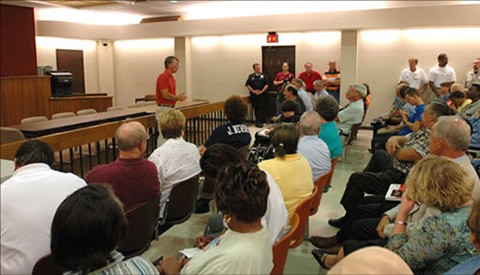No products in the cart.
Emergency Preparedness
Community Preparedness
Just as you purchase insurance for your home and car, you need to make an investment in your family’s safety. Emergency kits and survival supplies are remarkably inexpensive, so why take chances with your loved ones’ well-being?
American Family Safety’s extremely affordable ReadyKit™ contains all of the disaster supplies you’ll need to protect your family, and it meets official Department of Homeland Security guidelines for emergency kits. Take our “Are You Ready?” survey to determine your precise preparedness needs based on the number of family members and pets living in your home, your children’s ages,your geographic area, and your commuting and travel demands.
In addition to taking the proper steps to ensure your family’s safety during a disaster or emergency, you need to make sure your community is prepared. After witnessing the federal, state and local response to a major disaster like Hurricane Katrina, it’s more important than ever to make your voice heard.
Dr.Steven Taylor, an associate professor of government at American University in Washington, DC, offers the following advice on community disaster preparedness.
1. Vote If You Want Your Emergency Preparedness Needs to Be Taken Seriously.
Use the ballot box to convey your disaster preparedness concerns.
“Many elected officials look up residents’ voting records before they decide whether or not to respond to a resident,” Dr. Taylor says. “People who vote in both primaries and general elections on the local, state and national levels are taken more seriously.
“Vote in every election!” he urges. “If you feel there are no candidates deserving of your vote, then you should simply appear at the polls, go inside the booth and then leave. This way, you are recorded as having voted.”
2. Support Candidates Who Are Dedicated to Disaster Preparedness.
As we learned from Hurricane Katrina, elected officials at the local, state and federal levels play a major role in how disaster response is managed.
If you’re concerned about your community’s emergency preparedness and response capabilities, put your support behind a candidate who echoes your views.
“Get involved in that campaign,” Dr. Taylor says. “Even if the candidate loses,volunteers are taken seriously by elected officials. A person who works on a campaign is seen as representing more than just himself or herself.”
3. Don’t Be Shy About Stating Your Emergency Preparedness Concerns
“Concerned citizens should show up at officials’ offices, get to know them and their aides, write letters to them and hand-deliver them,” Dr. Taylor recommends. “I tell citizens to express their opinions about the issues at hand. Always express them in writing; then, they’re on file. But try to hand-deliver hem so elected officials and their staff members get to know you.”
4. Attend Community Forums on Emergency Response
Community meetings allow you to express your concerns about emergency preparedness and disaster response to elected officials.
“When a citizen at a forum makes a statement and receives supportive comments from others in attendance, elected officials take pause and view this as a statement coming from a group of people—not just one individual,” Dr. Taylor says.“Community meetings are also a way for citizens to meet elected officials and high-level municipal and county appointees.”
Remember your election year. Take Dr. Taylor’s advice so your voice can be heard on the vital issues of disaster preparedness and emergency response. And remember to do your part: Purchase your disaster kit today to protect your family.

